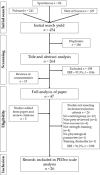Effects of Strength Training on the Physiological Determinants of Middle- and Long-Distance Running Performance: A Systematic Review
- PMID: 29249083
- PMCID: PMC5889786
- DOI: 10.1007/s40279-017-0835-7
Effects of Strength Training on the Physiological Determinants of Middle- and Long-Distance Running Performance: A Systematic Review
Abstract
Background: Middle- and long-distance running performance is constrained by several important aerobic and anaerobic parameters. The efficacy of strength training (ST) for distance runners has received considerable attention in the literature. However, to date, the results of these studies have not been fully synthesized in a review on the topic.
Objectives: This systematic review aimed to provide a comprehensive critical commentary on the current literature that has examined the effects of ST modalities on the physiological determinants and performance of middle- and long-distance runners, and offer recommendations for best practice.
Methods: Electronic databases were searched using a variety of key words relating to ST exercise and distance running. This search was supplemented with citation tracking. To be eligible for inclusion, a study was required to meet the following criteria: participants were middle- or long-distance runners with ≥ 6 months experience, a ST intervention (heavy resistance training, explosive resistance training, or plyometric training) lasting ≥ 4 weeks was applied, a running only control group was used, data on one or more physiological variables was reported. Two independent assessors deemed that 24 studies fully met the criteria for inclusion. Methodological rigor was assessed for each study using the PEDro scale.
Results: PEDro scores revealed internal validity of 4, 5, or 6 for the studies reviewed. Running economy (RE) was measured in 20 of the studies and generally showed improvements (2-8%) compared to a control group, although this was not always the case. Time trial (TT) performance (1.5-10 km) and anaerobic speed qualities also tended to improve following ST. Other parameters [maximal oxygen uptake ([Formula: see text]), velocity at [Formula: see text], blood lactate, body composition] were typically unaffected by ST.
Conclusion: Whilst there was good evidence that ST improves RE, TT, and sprint performance, this was not a consistent finding across all works that were reviewed. Several important methodological differences and limitations are highlighted, which may explain the discrepancies in findings and should be considered in future investigations in this area. Importantly for the distance runner, measures relating to body composition are not negatively impacted by a ST intervention. The addition of two to three ST sessions per week, which include a variety of ST modalities are likely to provide benefits to the performance of middle- and long-distance runners.
Conflict of interest statement
Richard Blagrove, Glyn Howatson and Philip Hayes declare that they have no conflict of interest. No funding was provided to support the preparation of this manuscript.
Figures
References
Publication types
MeSH terms
LinkOut - more resources
Full Text Sources
Other Literature Sources
Miscellaneous


